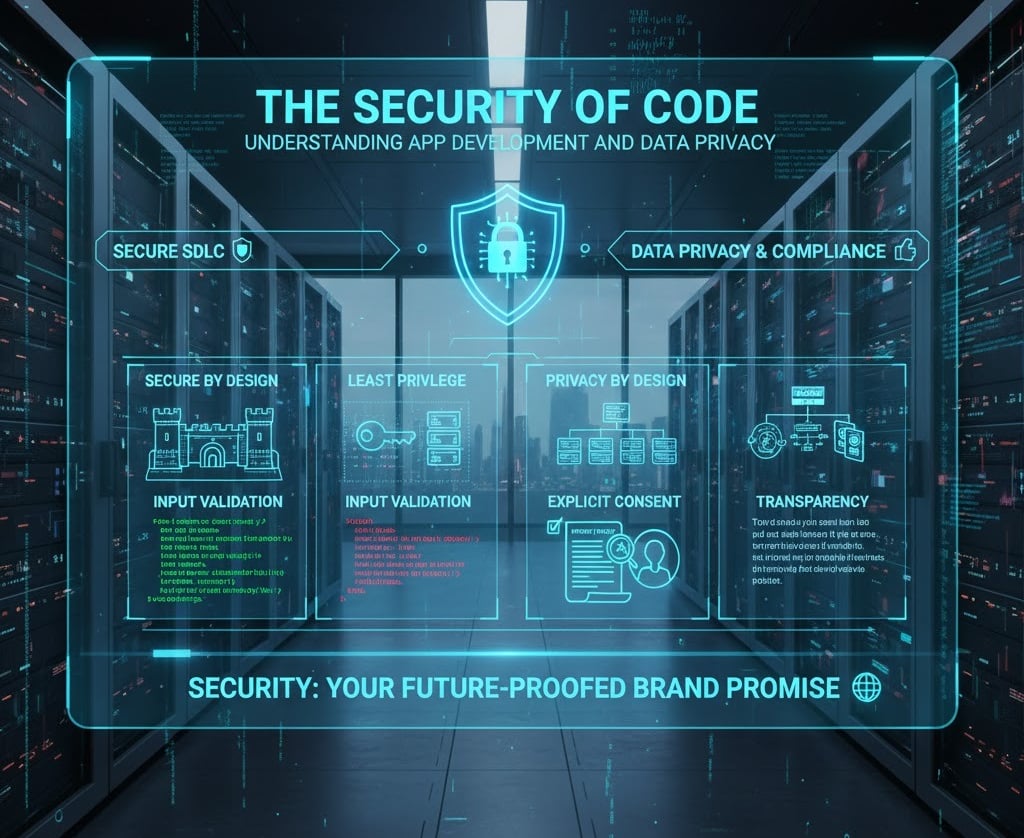The Security of Code: Understanding App Development and Data Privacy
Mr. Diyan Ahmed
10/10/20253 min read


SEO Idea: A critical blog post for businesses on building security and data privacy into custom apps from the ground up. It will explain key principles of secure software development and how to ensure compliance with laws like GDPR, emphasizing security as a core business function.
SEO Keywords: secure software development, data privacy regulations, app security, ethical tech development, cybersecurity in apps, GDPR compliance, secure by design, privacy by design, software development lifecycle.
In today's digital landscape, a custom-built app or software is a powerful business tool. But what's often overlooked is that every line of code you write, and every piece of data you collect, represents a potential security risk. Building a digital solution without a strong focus on security is like building a house without a foundation—it may look good, but it's bound to collapse under pressure.
The security of code is not an afterthought; it's a core principle that must be integrated into every stage of the development process. By adopting secure software development practices and adhering to data privacy regulations, you protect your business, your customers, and your reputation.
Building Security from the Ground Up: The Secure SDLC 🛡️
The traditional software development lifecycle (SDLC) focuses on planning, building, testing, and deploying. A secure software development lifecycle (SSDLC) integrates security into every one of these phases. This "shift left" approach addresses potential vulnerabilities early on, where they are far cheaper and easier to fix.
Key principles of a secure SDLC include:
Secure by Design: This is the most crucial principle. It means that security is a core requirement from the very beginning of the app's conception. Architects and developers must consider potential threats and design the application to be resilient from the start.
Least Privilege: An application should only be granted the minimum permissions and access it needs to perform its function. This minimizes the potential damage if a component is compromised.
Input Validation: A majority of app vulnerabilities, such as SQL injection, stem from unvalidated user input. Developers must treat all data coming from a user as untrustworthy and validate it to prevent malicious code from being executed.
Regular Security Testing: Security is not a one-time check. It must be a continuous process. Automated tools can scan code for common vulnerabilities, and manual penetration testing should be conducted to simulate real-world attacks.
Navigating Data Privacy with GDPR and Ethical Tech Development 🤝
Beyond technical security, custom applications must also comply with modern data privacy regulations. The GDPR (General Data Protection Regulation) is a prime example of a law that fundamentally changes how apps must handle user data, especially if they have users in the European Union.
To ensure GDPR compliance, your app needs to follow a few core principles:
Privacy by Design: This principle, a cornerstone of ethical tech development, means that you should build privacy controls into your app from the beginning. This includes only collecting the data you absolutely need (data minimization) and ensuring it is securely stored.
Explicit Consent: You must get clear and unambiguous consent from users to collect and process their personal data. This cannot be a pre-ticked box; users must actively opt-in, and you must make it as easy for them to withdraw consent as it was for them to give it.
Transparency: Your app's privacy policy must be easy to understand and clearly explain what data is being collected, why it's being collected, and how it will be used. You must also inform users about their rights, such as the right to access, rectify, or delete their data.
Conclusion: Security as a Brand Promise
In the digital world, app security and data privacy are no longer just a technical issue; they are a brand promise. An investment in secure software development and cybersecurity in apps demonstrates a commitment to protecting your customers, which builds trust and strengthens your reputation. By making security a core value, you not only avoid costly data breaches and legal fines but also position your business as a responsible and reliable player in the digital economy.
Connect
Partnering for innovation across industries.
Explore
Discover
+923001534092
© 2025. All rights reserved.
